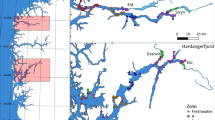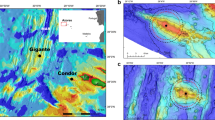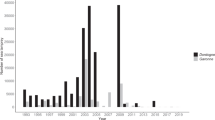Abstract
THERE have been many observations on the homing of adult salmonids to the river, and even part of river, of their birth and numerous attempts to elucidate the navigational cues used to locate and identify the freshwater home. In 1880, Buckland1 suggested that each river had a characteristic smell, and that olfaction played an important part in home-stream recognition. Homing by olfaction has since been demonstrated conclusively in Pacific salmon of the genus Oncorhynchus2–6, and neurophysiological evidence for the role of olfaction presented by Kara et al.7. Evidence is presented here which indicates that the homing of adult Atlantic salmon may be largely dependent on the presence of other individuals in the river.
This is a preview of subscription content, access via your institution
Access options
Subscribe to this journal
Receive 51 print issues and online access
$199.00 per year
only $3.90 per issue
Buy this article
- Purchase on Springer Link
- Instant access to full article PDF
Prices may be subject to local taxes which are calculated during checkout
Similar content being viewed by others
References
Buckland, F., Natural History of British Fishes (Unwin, London, 1880).
Alderdice, D. F., Brett, J. R., Idler, D. R., and Fagerlund, U., Fish. Res. Bd Can., Prog. Rept Pacific Coast Sta., 98, 10 (1954).
Wisby, W. J., and Hasler, A. D., J. Fish. Res. Bd Can., 11, 472 (1954).
Idler, D. R., McBride, J. R., Jones, R. E. E., and Tomlinson, N., Can. J. Biochem. Physiol., 39, 1575 (1961).
Fagerlund, U. H. M., McBride, J. R., Smith, M., and Tomlinson, N., J. Fish. Res. Bd Can., 20, 1457 (1963).
Hasler, A. D., Underwater Guideposts (University of Wisconsin, Madison, 1966).
Hara, I. J., Veda, K., and Gorbman, A., Science, N. Y., 149, 884 (1965).
Chidester, F. E., J. exp. Biol., 2, 19 (1924).
White, H. C., Trans. Am. Fish. Soc., 64, 360 (1934).
Miles, S. G., J. Fish. Res. Bd Can., 29, 1591 (1968).
Nordeng, H., Nature, 233, 411 (1971).
Oshima, K., Hahn, W. E., and Gorbman, A., J. Fish. Res. Bd Can., 26, 2111 (1969).
Severn River Board, Annual Reports (1959–1965).
Usk River Board, Annual Reports (1959–1965).
Wye River Board, Annual Reports (1959–1965).
Northumberland and Tyneside River Board, Annual Reports (1953–1960).
Somerset River Board, Annual Reports (1951–1965).
Somerset River Authority, Annual Reports (1966–1970).
Teichmann, H., Naturwissenschaften, 44, 242 (1957).
Author information
Authors and Affiliations
Rights and permissions
About this article
Cite this article
SOLOMON, D. Evidence for Pheromone-influenced Homing by Migrating Atlantic Salmon, Salmo salar (L.). Nature 244, 231–232 (1973). https://doi.org/10.1038/244231a0
Received:
Revised:
Published:
Issue Date:
DOI: https://doi.org/10.1038/244231a0
This article is cited by
-
Re-colonization of Atlantic and Pacific rivers by anadromous fishes: linkages between life history and the benefits of barrier removal
Reviews in Fish Biology and Fisheries (2014)
-
Homing and straying by anadromous salmonids: a review of mechanisms and rates
Reviews in Fish Biology and Fisheries (2014)
-
The complete history of salmonid introductions in the Kerguelen Islands, Southern Ocean
Polar Biology (2013)
-
Chemical Signal Mediated Premating Reproductive Isolation in a Marine Polychaete, Neanthes acuminata (Arenaceodentata)
Journal of Chemical Ecology (2005)
-
Observations on the effect of visual and olfactory ablation on the swimming behavior of migrating adult chum salmon,Oncorhynchus keta
Japanese Journal of Ichthyology (1992)
Comments
By submitting a comment you agree to abide by our Terms and Community Guidelines. If you find something abusive or that does not comply with our terms or guidelines please flag it as inappropriate.



